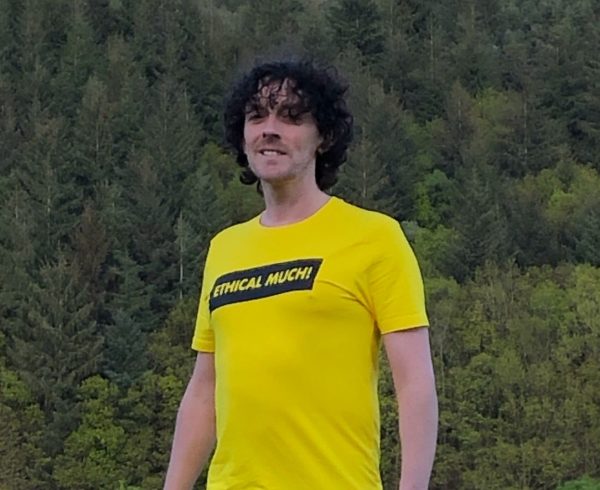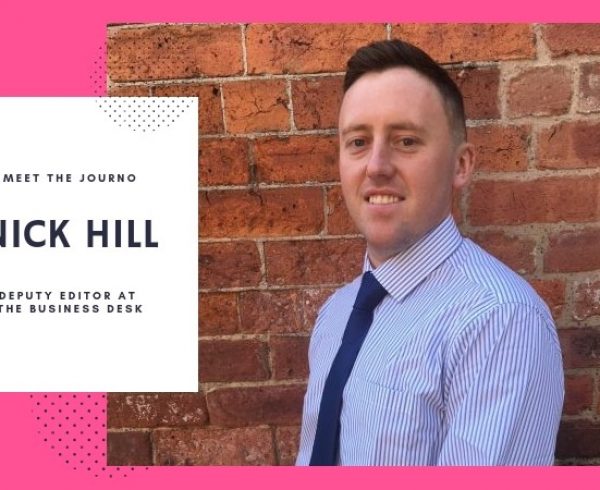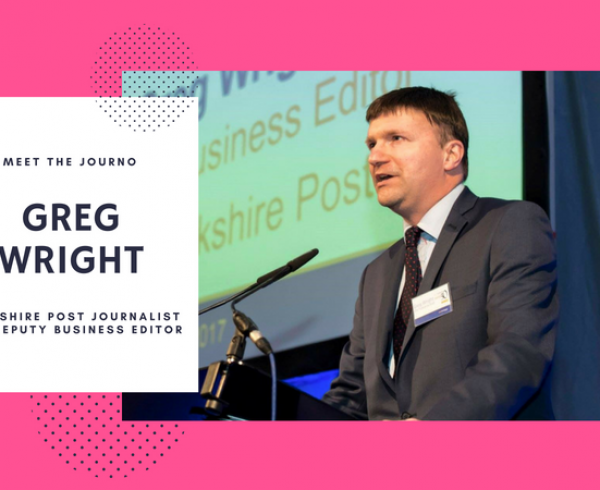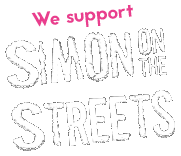Name: Rob Prevett
Publication: Disruption Hub
Twitter handle: @DisruptionHub
Rob Prevett is the main man behind Leeds-based publication D/SRUPTION Hub. With a number of pioneering, disruptive companies represented by MacComms, including our client Vet AI which featured in Disruption Hub’s magazine earlier this year (read the article here), our founder, Ellie, caught up with Rob to see what makes him tick and what advice he can offer to fellow business owners:
How did your career in journalism unfold?
I left school and spent two years unsuccessfully attending sixth form. I came out with no A levels and went into a job in a call centre which I hated. I quickly moved to another call centre and lasted three days! I didn’t know what I wanted to do but I knew I wanted something more meaningful. I happened to meet a guy in pub who was a neighbour of mine who advised of a job at the publishers he worked for. The next Monday evening, I received a knock on my door from the very same guy who had got me a job interview for the next day. He picked me up to take me and I got the job. This was 22 years ago, and he is still one of my best friends, I was best man for him at his wedding just last year.
At this publishing house, I began selling classified recruitment adverts. This was the 90s and we didn’t have computers, we literally had to do everything by telephone. I worked my way up to managing a magazine – Electronic Imaging which was all about digital printing. I then left and set up a rival magazine with a friend called Image Reports. I have since set up various magazines and events around digital technology.
I then launched Internet Retailing at the advent on e-commerce when people were questioning whether people really would give away personal information such as credit card details online and we took a bet that they would. This belief saw the publication grow phenomenally over 14 years. We sold the business in 2015 and set up Disruption Hub with my then business partner, John Straw, head of digital transformation at Thomas Cook, author of the book ‘iDisrupted’. I met John when he presented at my conference and we discussed running disruptive technology events and a magazine together and joined forces to do just that. We have gone from working from my bedroom to a team of eight based in Platform, Leeds with some team members working remotely. The business was acquired by The Panoply Holdings earlier this year and now we have ambitious plans and increased resource to take D/SRUPTION Hub global.
What inspires you the most?
Personally, I would have to say that my six-year old daughter, Clara is my biggest inspiration. I firmly believe that if you really want to understand a problem, ask a child – they have no baggage or preconceived ideas and they ask obvious questions which we should ask but we don’t because we learn to do things a certain way as adults. She does everything with a smile on her face too which is infectious.
Professionally, my mentor, Mark Pigou who ran Internet Retailing with me has been a huge inspiration. He has an amazing way of dealing with everyone from his employees, his contractors and everyone he works with. He makes everyone feel incredibly valued. He has taught me how to run a business not just to make money but with purpose and empathy and it is important to me to treat people right and as you would like to be treated. Purpose is one of our key values for Disruption Hub. Employees are given two hours paid time to volunteer in the local community a month and one day a year, we go as a group to do something meaningful together. Gender and diversity is really important to me too (see Rob’s article on this here: link), we really need to encourage a diverse range of backgrounds and experiences so that you have a mix of people who will ask different questions and give different answers.
What kind of stories particularly interest you?
Disruption Hub tries to shine a light on individuals and organisations who are doing something different and challenging the status quo. Whether that is using an innovative technology, developing a new business model or something which creates a positive impact for employees and society.
For us, real-life examples are important. People talk too much about concepts and ideas, but we know there are people who are doing these things and we want to champion stories of these people who are ahead of curve.
Practically, ensure that you give us and our audience a clear picture of what you’re doing. To do this ensure you pitch your story including who, what, when, where, how and why.
What’s the best story you’ve ever received?
The best story which comes to mind was a presentation at one of our recent events called Change Please, a coffee company set up to help homeless people off the streets. Change Please trains the homeless as barristers in London. They go back to the streets they lived on with a coffee cart. This is such a great demonstration of how to make a positive difference. The founder, Cemal Ezel is such a humble guy, he spoke at one of our events and had everyone in tears and he will be speaking at Disruption Summit Europe in September too.
What are some of your goals for the future?
We plan to build a community of individuals and organisations who are looking to build businesses of the future via our new venture, Disruption X. We have a role to play in changing minds and attitudes in how businesses are run – via what we write in our magazine articles, running events and bringing business leaders together to help make positive change.
We’re also keen to shine more of a light on the north and help people move away from a London-centric approach to business. We have seen Leeds become a fantastic tech hub and we’re set to champion further innovation in the north.
What are some common myths or challenges about a career in journalism?
My friends and family laugh at me as I run a publishing company yet can’t write very well! My spelling is atrocious! But you can have a career in publishing (or whatever differs from your own skill set.) The key is to surround yourself with people who are better than you at bespoke elements of the business.
Writing and publishing is no longer just about the written word. We’ve transformed and our writers are no longer just that – they need to be active on social media, speak at events, get in front of the camera, run podcasts and more. There are so many more channels to utilise and to be a successful publisher you need to recognise that your audience want to consume information in different ways and provide it in various formats.
What do you believe makes a great story?
A great story for me includes change. This would be the key word which sums up what D/SRUPTION Hub does. The world is changing, whether this is driven by new technologies and business models – gone are the days when you have a job for life. The only certainty is that job roles, companies and industries will change and when I look for a story it must have that element of change within in it. With this it is key to remember the personal angle too. We’re all people and it is individuals who are the most important part of change and so people should form the central part of any story.
What kind of publications do you enjoy reading?
I read The Economist religiously and a lot of my other reading comes from a diverse source – from links on Twitter and I also read Harvard business review. I try to read an eclectic range of books to gain inspiration, ideas and different perspectives. I also enjoy TED talks and podcasts.
How do you cope with the stress of tight deadlines?
I used to get stressed by deadlines when I was younger, but I no longer do. The closer I am to a deadline, the less I worry about as there’s less you can do. The key is to be organised, have good early warning systems to help flag any potential problems. Have a great team with regular meetings and good communication and use platforms such as Slack and Trello to help project manage everything. We encourage a real honesty as to where we are. If we’re going to miss a deadline, we all need to know so that we can do something about it.
Outside of work, what do you like to do in your spare time?
I enjoy spending time with my daughter, that is my absolute highlight. I like going to the gym and I love eating – I eat out quite a lot. Home is favourite restaurant in Leeds. Spending time with family and friends is important to me too.
What piece of advice would you give to people wanting to pitch their business to you?
Don’t be afraid to get in touch, we’re always happy to talk to people. Give us a call, pop into Platform and come and meet the team over a cup of tea. Importantly, come to us with a good idea of what the proposition is. We have around 20 people a day contact us to ask if they want to write about something without saying what they do.
Think about who our audience is and what they want. And don’t be afraid to say you’re excellent at something – we’re too British! This is often the reason companies struggle to get investment – if you can convey how and why your company is awesome this will help us include your news and help investors back you.
Finally, what’s your favourite thing about Yorkshire?
My favourite thing about Yorkshire is the countryside. I love Leeds, I spend a lot of time in Roundhay Park and love that I can jump in the car and within 10 minutes I’ll be in the great Yorkshire countryside.






